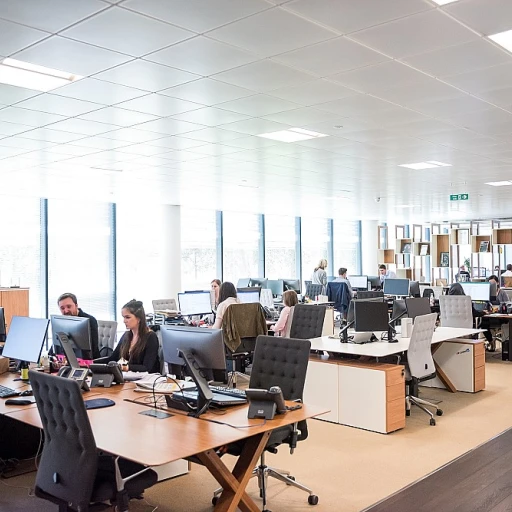
Understanding Employee Excellence
Recognizing the Essence of Employee Excellence
In the intricate tapestry of modern business, understanding what makes employees excel is crucial for any organization striving for success. It’s not just about filling a job position; it’s about harnessing the qualities of good employees who actively contribute to the company culture and business objectives. Finding employees with strong traits is essential for a positive work environment. Workplaces thrive when they are infused with enthusiasm, innovation, and teamwork. Great employees are those who not only perform well individually but also elevate their team and foster a positive office atmosphere. These stellar performers stand out due to a combination of specific qualities:- Critical Thinking and Problem Solving: This trait enables an individual to navigate challenges effectively, saving the company significant time and resources.
- Commendable Work Ethic: A strong commitment to their job and company is unmistakable in best employees, displaying a positive attitude and reliability.
- Effective Communication: Being able to communicate well is a key skill for any excellent employee. It promotes clarity, enhances collaboration, and reduces workplace conflict.
- Emotional Intelligence: The ability to manage one’s emotions and understand others' emotions is an asset. It helps in building strong teams and fostering a supportive work environment.
- Adaptability and Flexibility: The best employees can adjust to changes and new demands quickly, helping the company remain agile and competitive.
Role of HRIS in Identifying Talent
Utilizing HRIS for Talent Discovery
Human Resource Information System (HRIS) plays a pivotal role in pinpointing exceptional employees within a company. When seeking out those who exhibit enhancing employee performance, HRIS tools offer comprehensive insights into employee profiles, tracking both hard and soft skills. This allows businesses to efficiently identify individuals who can drive the company forward.
Great employees exhibit qualities good for the workplace such as being a team player, possessing strong communication skills, and maintaining a positive attitude. HRIS efficiently categorizes these traits, highlighting team members who are not only detail oriented but also excel in critical thinking and time management. By assessing past work performance, HR professionals can ascertain which employees demonstrate a robust work ethic and align with the company culture.
The use of HRIS allows for the collection of detailed employee information, offering a complete view of their contributions over time. By leveraging this data, HR managers can efficiently pinpoint which individuals are poised to make significant impacts within their teams. Ultimately, this process aids in creating a more positive work environment where good employees are rewarded and fostered for future long term growth.
Core Characteristics of Top Performers
Unveiling the Essence of Top Performers
In any workplace, exceptional employees stand out through a distinct set of qualities. Their intrinsic traits not only propel their growth but also elevate the entire company's performance. Identifying these characteristics is vital for building a robust team and fostering a positive work environment. One of the noteworthy qualities good employees consistently demonstrate is a positive attitude. It's the lens through which they view the work environment, thus spreading enthusiasm and contributing to a strong company culture. Moreover, excellent communication skills allow these employees to articulate ideas clearly and collaborate effectively with team members. In the dynamic modern business world, time management is another trait of great employees. Being detail oriented, these individuals can navigate their schedules efficiently, ensuring timely completion of tasks without compromising quality. Their ability to manage their work life contributes to long-term growth and organizational success. Another critical attribute is emotional intelligence. Great employees understand their own emotions and those of others, fostering harmonious relationships within the team. This awareness helps them to remain calm under pressure, resolve conflicts, and contribute to a positive undercurrent in the workplace. Critical thinking is indispensable for top performers. These employees possess the problem-solving skills necessary to overcome challenges, driving innovation within the company. Coupled with a strong work ethic, they set a benchmark for reliability and dedication. The best employees excel in being team players. They understand the business values, align with company goals, and willingly support others in achieving shared objectives. Their presence significantly enhances team dynamics, creating an environment where everyone feels valued and included. These traits form the cornerstone of what makes employees not just good, but exceptional. Leveraging HRIS can help enhance these efficiencies by identifying and developing such top performers, ensuring the company's continued success and competitiveness.Nurturing Potential Through HRIS
Fostering Growth with the Right Tools
Nurturing potential in employees is not just about recognizing their strengths and qualities; it requires a commitment from the company to provide the necessary tools and resources for growth. Human Resources Information Systems (HRIS) play a crucial role in this process by offering a platform to identify and develop these strong traits in a systematic manner. To cultivate an environment where employees can thrive, consider the following strategies:- Provide Regular Feedback: Constructive feedback helps employees understand their strengths and areas for improvement. A good HRIS can facilitate this process by tracking employee performance and offering insights based on data over time.
- Create Clear Career Paths: Employees need to understand how they can grow within the company. By using HRIS, businesses can map out detailed career development plans that align with company goals and employee aspirations, enhancing the workplace experience.
- Offer Training and Development: Continuous learning opportunities are key to nurturing potential. HRIS can track the progression of skill development and provide recommendations for workshops or courses that match an employee's career aspirations.
- Encourage a Positive Work Environment: Great employees thrive in a supportive culture. Utilize HRIS to regularly assess employee satisfaction and workplace culture, ensuring a positive atmosphere that promotes well-being and productivity.
- Recognize and Reward Performance: Acknowledging achievements motivates employees to maintain strong performance. HRIS can automate the tracking of accomplishments and implement reward programs that are aligned with employee performance metrics.
Measuring Success with HRIS Analytics
Tracking and Evaluating Employee Progress
Once the core characteristics that make a strong contributor to the workplace have been understood, measuring their success is essential. Here’s where Human Resources Information Systems (HRIS) become invaluable tools for businesses. HRIS provide advanced analytics to track the progress of employees and help in evaluating their performance over time. This is crucial for companies to ensure that great employees continue to contribute positively to the company culture.
Effective use of HRIS allows for detailed assessments that help in identifying qualities good employees possess. These systems can monitor key traits such as time management, communication skills, and critical thinking, traits that are indicative of top performers. HRIS analytics can also measure how well team members work together, reflecting on their team player qualities.
By using data-driven insights, companies empower their HR teams to evaluate whether individuals demonstrate strong work ethic and a positive attitude in various job roles. Companies can leverage these insights to foster a work environment that nurtures emotional intelligence and other critical skills, ensuring the growth of both individuals and teams.
Ultimately, the ability of HRIS to generate reports and track key performance indicators means businesses can recognize and reward good employees effectively. This not only helps in retaining talent but also promotes a workplace where employee qualities are recognized and valued, leading to the development of future great employees who fit well into the long-term goals of the company.
Future Trends in HRIS and Employee Development
Pioneering Developments in HRIS for Employee Growth
The landscape of human resources information systems (HRIS) continues to evolve, bringing new opportunities for companies to support their employees effectively. With advancements in technology, HRIS is at the forefront of enhancing employee development by empowering individuals and teams with the right tools.- Enhanced Personalization: Future HRIS tools will increasingly focus on personalized learning and development paths. By leveraging employee data, these systems can recommend tailored training programs that align with individual skills and company needs.
- Improved Analytics: As data analytics capabilities grow, HRIS platforms will offer even deeper insights into employee performance and development, helping businesses to identify potential areas for growth and improvement.
- Emphasis on Well-being: The best employees thrive in a work environment that prioritizes well-being. Advanced HRIS solutions will provide features to monitor and enhance workplace wellness, contributing to a positive company culture.
- Integration with Other Business Tools: Seamless integration with various business software will ensure that HRIS platforms deliver comprehensive support across different aspects of human resources and overall company operations.
- Focus on Remote Work: With the rise of remote work, HRIS will adapt to ensure great communication skills and effective team collaboration regardless of physical location. This will help nurture strong team players who embody the qualities of good employees.













